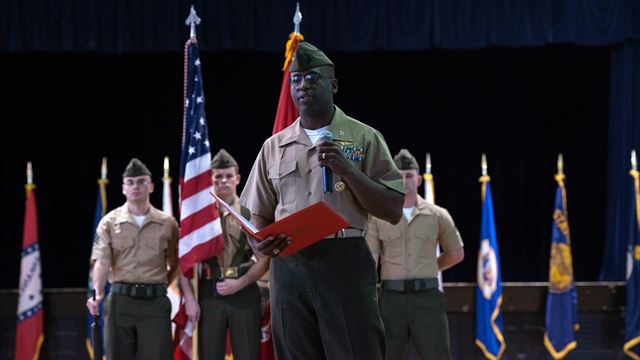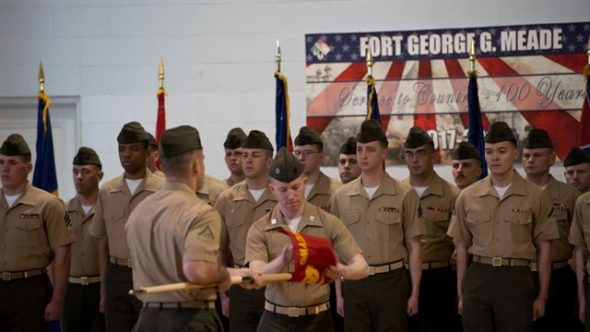
Col. Ossen J. D’Haiti, the commanding officer of MCCYWG, speaks to the audience during the activation of command ceremony of Marine Corps Cyberspace Warfare Group at Fort George G. Meade, Maryland, March 25, 2016. The mission of MCCYWG is to man, train and equip Marine cyberspace mission teams to perform both defensive and offensive cyber operations in support of United States Cyber Command and Marine Forces Cyberspace Command.
redo Jump to...
print Print...
(by Matthew M. Burke, Stars and Stripes) – The Marine Corps is standing up a new unit of cyberwarriors as the global battlefield evolves to include more and more computer networks.
The Marine Corps Cyberspace Warfare Group (MCCYWG) was activated Friday in a ceremony at Fort George G. Meade, Md., a Marine Corps statement said. Its mission is to man, train and equip Marine cyberspace mission teams to perform both defensive and offensive operations in support of U.S. Cyber Command and Marine Forces Cyberspace Command.

Marines with Marine Corps Cyberspace Warfare Group prepare to post the guidon during an activation of command ceremony at Fort George G. Meade, Maryland, March 25, 2016.
The unit has “a few” cyber teams up and running, the statement said; however, it won’t be fully operational until sometime next year.
“We’ve always had the means to communicate and the means to protect that communication, but today we’re in an environment where those methods are more and more reliant on a system of transmissions, routers and networks,” the unit’s commander, Col. Ossen D’Haiti, said in the statement. “So, the ability to protect that, the ability to control that and deny an adversary to interdict [intercept (our communications)], is crucial to command and control.”
Everything from power grids, banking, government operations to defense contractor weapons’ plans have shifted online in the past few decades. That information is a tempting target for both state-sponsored hackers and criminal organizations that are becoming increasingly sophisticated at cybertheft.
During a town hall meeting with Okinawa Marines in November, Marine Corps Commandant Gen. Robert Neller [said] that China had stolen military secrets from the United States.
“While we’ve been fighting, our adversaries, many of them in this part of the world — pick one: China, North Korea, Iran, Russia — what have they been doing? Making money, buying new gear, stealing all of our secrets,” he said. “Ever look at all the Chinese equipment? What’s it look like? It looks like our stuff. How is that? They stole our stuff, fair and square.”
The Navy, Army, Air Force and Coast Guard are also actively recruiting cyber soldiers and standing up their own cyber units and programs.
Reprinted here for educational purposes only. May not be reproduced on other websites without permission from Stars and Stripes. For the original article, visit stripes .com.
Questions
1. Define the following as used in the article:
- cyberwarrior
- operational
- adversary
- command and control
- state-sponsored
- cybertheft
2. What is the mission of the newly created Marine Corps Cyberspace Warfare Group (MCCWG)?
3. When will the MCCYWG be fully operational?
4. The U.S. Military has always had the means to protect their communications. Why has it now become vulnerable to theft?
5. What types of information are targets for hackers?
6. a) What did Marine Corps Commandant Gen. Robert Neller say about our adversaries during a townhall meeting with Okinawa Marines?
b) What do you think the U.S. government should do about this? Ask a parent the same question.
7. The Navy, Army, Air Force and Coast Guard are also actively recruiting cyber soldiers and standing up their own cyber units and programs. Do you think this would be a good career? Explain your answer.
Daily “Answers” emails are provided for Daily News Articles, Tuesday’s World Events and Friday’s News Quiz.



